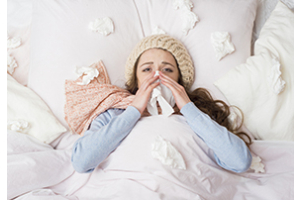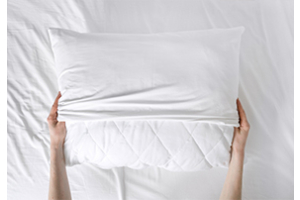Spring Clean Your Bedroom For Better Sleep

Spring Clean Your Bedroom For Better Sleep
Finally, that time of year is here again, when the winter blues melt away and we wake up to the colours of spring bursting all around. There’s a happy buzz in the air. It’s warmer and brighter. And that buzz is probably also a little bee in your bonnet that wants to shake things up. It’s out with the old and in with the new. It’s time to spring clean, not least your sleep.
Spring cleaning your sleep.
There are two important ways to spring clean your sleep. One is the physical deep cleaning and airing of the mattresses in your home. The other, perhaps more importantly, is the conscious readjusting of your sleep routine and environment. You need to get yourself, as well as your bedroom, sleep-ready for summer.
Let’s start in the bedroom.
5 tips on spring cleaning the bedroom.
1. Deep clean your mattress – There’s nothing like a warm winter mattress to attract the minutest of crawlies. Even with a hypoallergenic mattress, or mattress cover, micro bugs unseen to the naked eye can make a home for themselves. A deep mattress vacuum clean is a good start. Then leave the mattress out in direct sunlight for the day, turning it over at midday. Keep the mattress flat. This is especially important to maintain the integrity of the inner design and engineering, as well as to get the maximum sun exposure during the day. Depending on the care instructions of your mattress, you could also consider a deep, wet-vacuum clean. Though direct sunlight should disperse the remaining moisture, you can also sprinkle the surface of the mattress generously with baking soda to lift out surface humidity.
2. Consider the bedroom layout – A bedroom atmosphere should, ideally, remain simple and familiar. It should always be a quiet, inviting chamber that helps to induce relaxation and sleep. Two things happen in winter. It’s colder and the angle of the sun shifts. In spring, it all changes back again. Keeping the temperature of the bedroom on the cooler side, as well as allowing the flow of fresh air, helps with maintaining a comfortable sleeping environment. If you have the space, consider a more advantageous position of the bed to accommodate maximum airflow with minimal sunlight interruption.
3. Lighten the bedclothes – This may seem obvious, but springtime is the ideal season to be taking control of your sleep and preparing ahead. Besides sleeping in lighter pyjamas, you will want to swap out your winter duvet for a summer cover. If you have thicker, warmer sheets and pillow cases, swap those out, too. Consider taking off the electric blanket to allow easier summer breathability of your mattress.
4. Swap out the accessories – Put away the heater and the extra blankets. Get those mosquito pads or nets ready. If you have air conditioning units in your bedrooms, spring is a good time to have them serviced, with clean filters ready for the months ahead. For some, the constant hum of an air conditioner can be disruptive to sleep. Instead, consider a gentle fan placed strategically to help with airflow through the bedroom, rather than blowing directly at the bed. Instead of a draft, the aim is to keep the air temperature in the bedroom as mild as possible to allow your own body temperature to self-regulate throughout the night.
5. Sunlight control – If you’re an early morning riser, you’ll have no problem waking up to a welcoming sunrise. If you tend to sleep later and therefore would want to wake up a little later, well past sunrise, you’ll want to keep the bedroom space darkened through the first hours of the morning. A simple set of blinds, or a thicker pile of curtaining, should be effective. Be sure to include a proper dusting and cleaning of blinds and curtains during your spring clean.
5 tips on spring cleaning your sleep.
This is where we take the expert advice of sleep scientist, Dr Dale Rae. Apart from the important, physical preparation of the bedroom is the conscious approach we should take to adjust our sleep patterns with the approaching change in season.
Dr Rae shares a few pointers:
1. Reassess your sleep schedule – It is natural for our sleep schedule to shift slightly between seasons. You may begin waking earlier as the sun starts rising earlier, however, you may find longer summer days also delay bedtime. Be sure to still prioritise getting the full 7-9 hours of darkened sleep that is generally needed and try to stick to a consistent bedtime and wake-up time (that works for you and your natural body clock) as far as you can. If you are naturally disposed to sleeping and waking later, you will need to manage the interruption of earlier sunrises streaming into the bedroom.
2. Calm down towards bedtime – The approaching warmer months can sometimes have a heady effect. Our mood lightens. There’s more time to enjoy with family and friends outdoors. Without turning into the sleep police, you may well benefit from calming things down into the evening, especially during the school and working week. Finding, and sticking to, that “downtime off-switch” just prior to hitting the sack can help the whole family wind down and, from a quietened state of relaxation, drift off into a good night’s sleep.
3. Manage your allergies – When spring is in the air, some of us have a hard time adjusting. Pollen can play havoc with sinuses, which in turn can make breathing during sleep difficult. Actually – you might find you snore more, which can disturb your own sleep and that of your bed partner! If you are someone who is regularly affected by high pollen counts, plan ahead. Try not to lose any sleep over it. Have the antihistamines to hand that will help to alleviate the onset of allergic sinusitis. Another simple way to manage the build-up of allergens is to have a saline nasal douche available. Ask your local pharmacist to suggest one of the many remedies available.
4. Stay cool and hydrated – Our body temperatures should naturally dip throughout the night. Warmer temperatures may interfere with this, making it difficult to fall asleep or stay asleep, so aim to try and keep your sleeping environment as cool as possible. Take care though: drinking excessive amounts of water just before bedtime is not the best idea as you don’t want to be woken by pressing, midnight toilet visits.
5. Diet and exercise – What you eat, when you eat, and how much you eat during the day can have an impact on your sleep later on in the evening. However, it is important that we do manage a balanced dietary intake during the day so that we don’t need a heavy meal in the evening. Your last meal of the day should preferably be 3 hours before bedtime, allowing for proper digestion. During the warmer months of the year, it may be easier to stick to an early-morning exercise routine than during winter when it is dark and cold. Regular exercise is incredibly important for good quality sleep but bear in mind that if you are naturally more of an “evening-type”, a 5am wake-up call may be very difficult for you to maintain. Evening-types may be better suited to exercising later in the day, potentially after work, taking advantage of the longer daylight hours, as long as it is not too close to bedtime. Rigorous evening exercise that is close to your usual bedtime is not recommended as your body needs time to cool down and relax ahead of sleep.
For more on regenerating your sleep health this springtime, visit www.sleepscience.co.za. Or check out the Sleep Science Facebook resource that is full of practical advice on common sleep issues. Go to https://www.facebook.com/www.sleepscience.co.za. You may be surprised what a difference good sleep can make to your day.
Upgrade your spring sleep at Dial•a•Bed.
Put your sleep health at the top of your spring-cleaning list. When last did you deep-clean your mattress? Could your mattress do with the hypoallergenic protection of a mattress cover? In fact, how old is your mattress and when last did you try out the latest in sleep innovation and mattress design? Nothing puts more oomph into your day than the perfect night’s sleep. #SleepForLife
TAKE CARE: Lifestyle recommendation is not medical advice. Always consult your healthcare professional should you be experiencing prolonged sleep difficulties or related health issues.






